Socialist Voice is Ireland’s oldest progressive publication, dating back to 1930. Throughout its almost century of working class and revolutionary journalism, it was a leading voice on the abuses within church and state institutions, news and information on the Union of Socialist Soviet Republics, China, Cuba, Vietnam, Nicaragua, and anti-imperialist movements across the globe, a voice for women and birth control/reproductive rights, trade union support and analysis, tenants’ movements, Irish language support, working class news, culture and poetry and the continued publications of revolutionary Irish writings by the likes of James Connolly and Theobald Wolfe Tone.
From Humble Beginnings
The first issue of Socialist Voice, then called the Irish Workers’ Voice, debuted to Irish readers on April 5th 1930, following a decision made at a Dublin Conference of revolutionary groups from across the island of Ireland, to help support the building of a Marxist revolutionary party – laying a foundation for the launch of the Communist Party of Ireland.
A Manifesto adopted by the Conference declared:
“In Ireland, as a consequence of past tradition, disrupting leadership, and general confusion of purpose, there exists as yet no party of the working class, and no paper to voice the needs of Irish workers and help them to organise their forces against the employer and governments with despoil them.
The time for this to be remedied is long overdue…”

Some of its first issues featured Jim Larkin Jnr, writing about various trade union congresses, from Moscow and closer to home, for readers of the Irish Workers’ Voice. In his writing on the 1930 Irish Trade Union Congress, he wrote; “From the first word to last the annual conference of the Irish Trade Union Congress did not strike a class note. The real problems facing the workers were not dealt with … It was a gathering of trade union politicians who were more concerned in their own careers than the interests of the working class.” (Irish Workers Voice, August 9, 1930)
The Irish Workers’ Voice and other forms of printed material, as well as public meetings in Belfast and Dublin were among the means in the building of the Revolutionary Workers’ Groups.
Failed attempts to shut us down
However, this progressive working class publication faced numerous hurdles through the 20th century. Anti-communist hate campaigns from fascist and clerical groups had on numerous occasions attempted to destroy the Socialist Voice, and its previous iterations, through harassing journalists, attempting to get them fired and blacklisted, printers refusing to produce the paper, and even burning down the newspaper’s headquarters in Dublin in 1933. For more on that, read about the history of Connolly Books here.

It was in the period of advancing reaction in Europe, Mussolini’s Italy and Britain and France preferring Hitler in power rather than the working classes, that Cumann na nGaedheal (Fine Gael) sent out a circular to its branches warning to be on the alert for any and all signs of “Communistic” activities and to rally young men to counter their efforts.
The phoney organ of religion, ‘The (Catholic) Standard’ was to the fore, but also giving a helping hand in the anti-communist, anti-working class tirades were the ‘Irish Times’ and the ‘Irish Independent’. They were for a ‘fight by every means in our power’ to halt the progress and work of the Irish Workers’ Voice.
Viva la Quinta Brigada!
During the Spanish Civil War, as the church and Cumman na nGaedheal rallied support for fascist Franco, the Irish anti-fascists stood firm. They were helped in this by the clear and consistent analysis given by Seán Murray, the General Secretary of the Communist Party of Ireland, in his weekly articles on Spain in the pages of The Worker. This stimulated the clarity and courage of many in the Irish Labour and Republican movements.
In our issue from July 27th 1936 noted, regarding Spain, “the reports published by the capitalist press are like a dust cloud obscuring the fighters as they strain in combat. But from the glimpses of the truth we can picture the rest; and the heart of the working class [of] Ireland goes out to our Spanish brothers and sisters in their life and death struggles with Fascism.”
The Workers’ Voice, and later iterations, can proudly count a number of veterans who fought against fascism in Spain as its journalists and supporters throughout the following decades.
A time of change
As the Revolutionary Workers’ Groups developed into the Communist Party of Ireland (CPI) in 1933, The Irish Workers’ Voice became its official newspaper and the publication took various forms in response to hostilities and anti-communist legislation. It was banned in the north, along with other left wing and republican newspapers, in 1940. It was then out of print from 1941 due to the Second World War, and the CPI being inactive, but relaunched in 1949 with the Irish Workers’ League. When the Irish Workers’ League and the Communist Party of Northern Ireland, and their respective youth organisations, re-merged into an all-island Communist Party in 1970, the Irish Workers’ Voice returned as a 32-county publication with renewed popularity during civil rights movements and the Troubles.
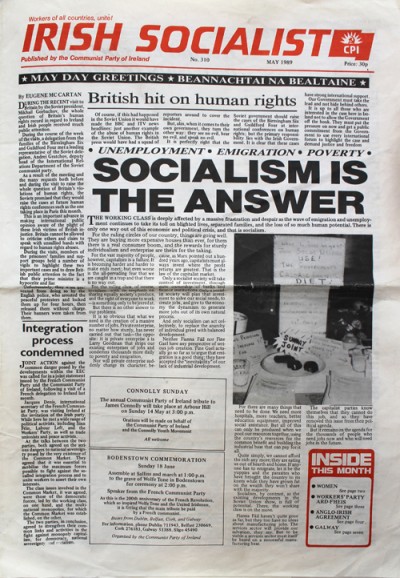
Unity, which was specific to the situation in the occupied 6 counties, Irish Socialist, a monthly newspaper and Forward, a youth-focused magazine through the Connolly Youth Movement, were additional publications by the CPI and sources of working class journalism in Ireland through the end of the 20th century. A number of these publications, including the Irish Workers’ Voice, were amalgamated at the turn of the century and the Socialist Voice, first as a newsletter and then a monthly newspaper, was launched in 2003.
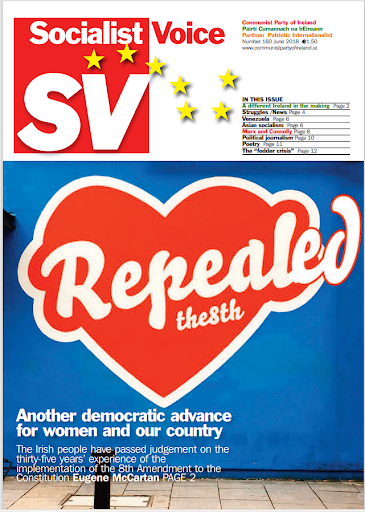
Entering its third decade of dedicated monthly writings, it has played a significant role in anti-war and Irish Water movements, analysis of the 2008 financial crash, Irish feminist and LGBTQ+ theory, marriage and abortion referenda, and an important voice for workers across political, economic and social branches of Irish society.
Contributors to this publication, past and present, include Sam Nolan, Betty Sinclair, Michael O’Riordan, Eugene McCartan, Jimmy Corcoran, John McDonnell, Laura Duggan, Jenny Farrell, Tommy McKearney, Eoghan O’Neill, James Stewart, Mick O’Reilly, John Montegomery and many more.
The paper is available to purchase in person at Connolly Books, 43 Essex Street, Temple Bar, Dublin or you can purchase a yealy subscription here.
Notable Impacts
Church & State
According to historian Conor McCabe, “In the 1930s the ‘godless communists’ of the Irish Workers’ Voice consistently raised the horrific abuse taking place in industrial schools. It took the Irish State another 70 years to finally admit that the abuse was systemic & institutionalised.”
A front page article of the Irish Workers’ Voice, published May 4th 1935, reported:
“My boys body was black and blue” says sorrowing father to ‘Voice’… a tragedy that has shocked the working class and parents of all parts of Ireland – the death of his son, John Byrne, a 15-year old boy as a result of injuries received at Artane industrial school… Unless this tragedy is properly investigated workers will have no other option but to believe that conditions in Artane are being deliberately covered up by responsible people. This is not the first death there in suspicious circumstances.”
The Socialist Voice / Irish Workers’ Voice has a long history of highlighting abuses by church and state, particularly in its support for the emancipation of women. We were one of the first papers to research and run stories on the mother and baby homes abuses in Ireland, running a two-month piece called “The Unmarried Mother by One of them” in 1970.
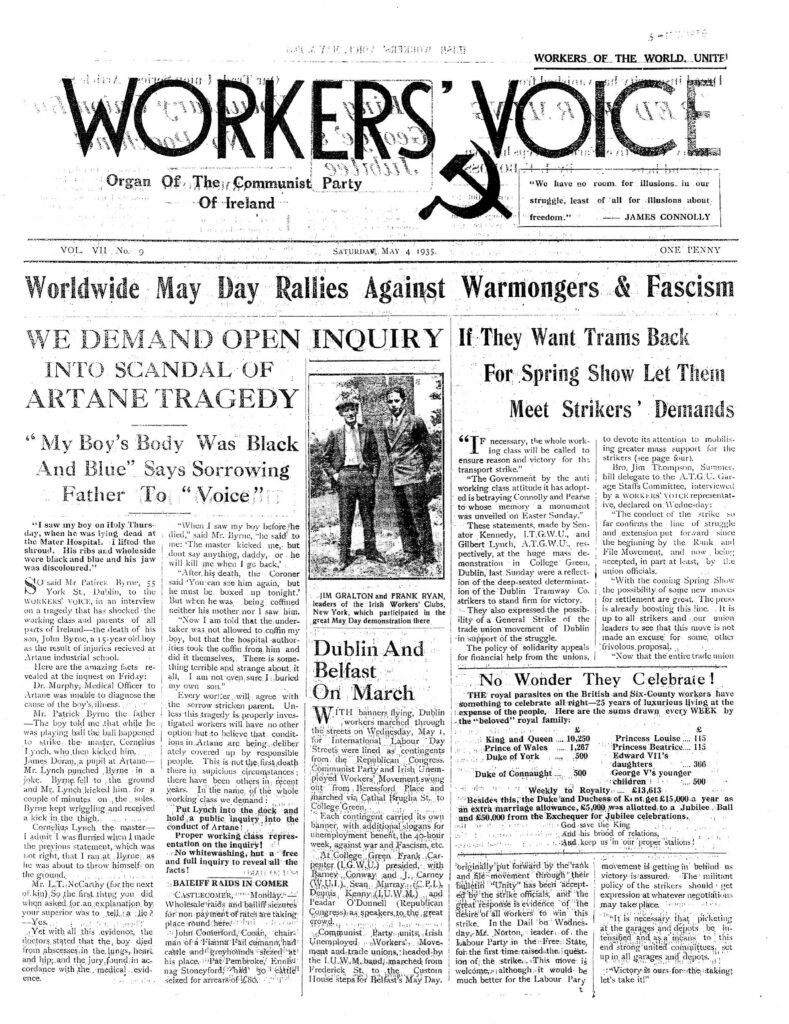
The European Union
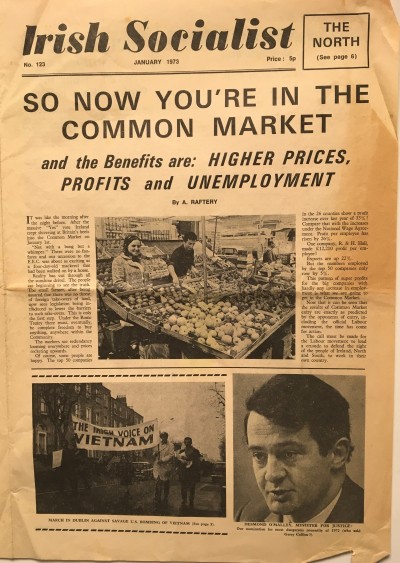
The Voice has continually denounced the European Union as an undemocratic structure that acts primarily against the interests of the working class. It regularly features articles pointing to the irreformable nature of the EU and the necessity of breaking with the EU to restore democratic control and popular sovereignty and has been doing this since the referendum on whether Ireland would join the EEC back in 1972.
The publication successfully highlighted the negative impacts the Nice and Lisbon treaties would have on the sovereignty of the state and the weakened position workers would have in the running of the country. Both were rejected by the people in the first referenda. These amended treaties had rippling effects across the continent.
Following the 2008 financial crash when exorbitant amounts of European banking debt were foisted on Irish workers, our message of ‘Repudiate the debt, it’s not the people’s debt’ became a key narrative across the years of austerity that followed.
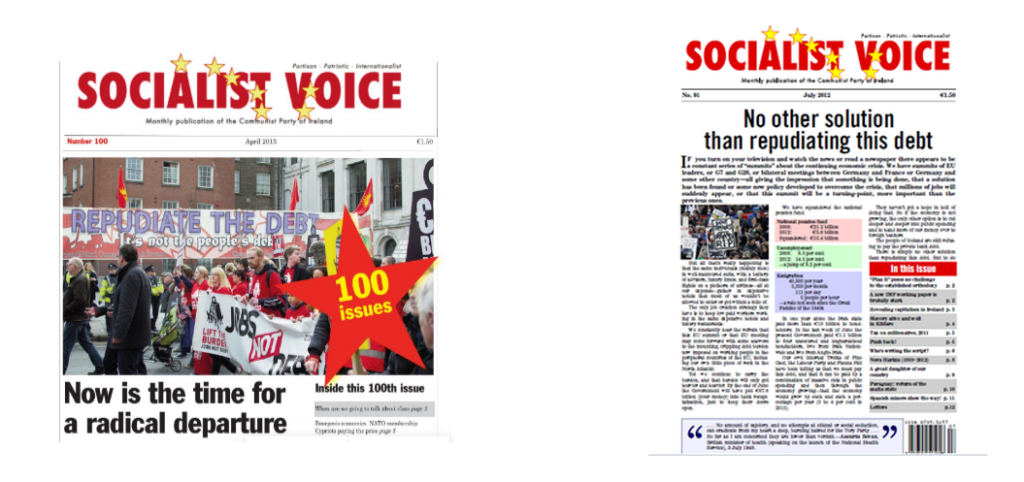
The Voice continues to be a significant player in the fight against the militarisation of the EU, PESCO and other warmongering attempts by European and Irish politicians and media outlets.
In May 2012 the Communist Party of Ireland along with British and Portuguese communist parties issued a statement calling on other communist parties to adopt a common position against the Treaty on Stability, Coordination and Governance in the Economic and Monetary Union and the revised Treaty on the European Stability Mechanism (ESM). We determined that these treaties would simply “make ‘Eurozone’ member states and practically all other countries signing these agreements into permanent regimes of economic austerity involving deeper and deeper cuts in public expenditure, rises in indirect taxes, reductions in wages, sustained liberalisation of markets and privatisation of public enterprises, services and vital national assets.” Our statement was a phenomenal showing of international solidarity as 15 other European communist parties signed the statement.
Voice for Progressive Movements
The Socialist Voice newspaper has always supported grassroots working class movements. We worked closely with the broad coalition who opposed water privatisation. In the September 2015 edition of Socialist Voice, we very clearly laid out the reasons against the privatisation of water:“Price increases have been used globally as a way for private water companies to maximise profits. The bottom line for these companies is profit, which translates into higher prices and inferior service for consumers.”
We have always supported trade union rights and this means we have been fighting a long campaign against the 1990 Industrial Relations Act. We see this act as crippling the already weak Irish trade union movement as one of our writers Jimmy Doran said “The 1990 act was introduced as a control mechanism on trade unions.” Not only did this act remove the basic features of trade union rights like a banning of sit-ins it also gives the employer greater power as they must be given a seven-day notice before a strike can commence.
We also support groups like the Community and Tenants Union (CATU), the Peace and Neutrality Alliance (PANA), the Cuba Solidarity Forum Ireland (CSFI), the Irish-Palestinian solidarity Campaign (IPCS), the Trade Union Left Forum (TULF), and many more.

The Socialist Voice has always had a strong pro-neutrality, anti-imperialist outlook. The paper has understood that young people being sent like lambs to the slaughter only benefits the stockholders of Lockheed Martin and other companies. We have extended support for all progressive forces who fight against imperialism. Our contributors continue to call out the chauvinism and double standards of the United States and EU towards the Zionist genocide in Gaza, with the frontline of anti-imperialist struggle now in occupied Palestine.
For more on the history of Ireland’s progressive working class movements and publications, the following are available from Connolly Books:
● From Lucifer to Lazarus: A Life on the Left, by Mick O’Really
● Left Lives in 20th Century Ireland Vol. 3
● Left Lives in 20th Century Ireland Vol. 4



